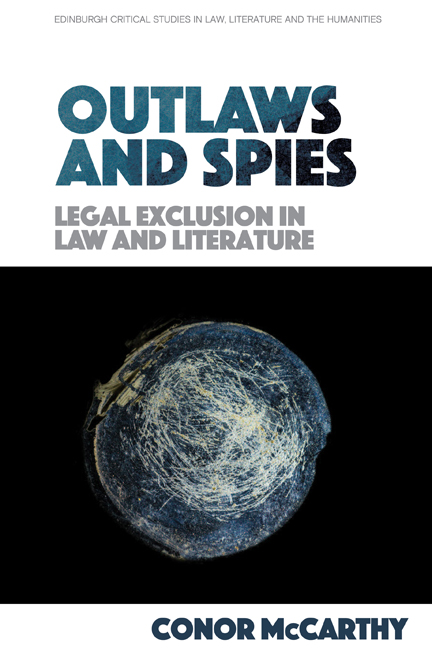Book contents
- Frontmatter
- Contents
- Acknowledgements
- Introduction
- 1 Outside the Law in the Middle Ages
- 2 Sovereign Outlaws: Shakespeare’s Second Tetralogy
- 3 The Endurance of Exclusion: Versions of Ned Kelly
- 4 ‘We’re Not Policemen’: Espionage and Law in John le Carré
- 5 ‘All Plots Tend to Move Deathward’: Plots and Consequences in Don DeLillo
- 6 Unanswered Questions: Ciaran Carson
- 7 Contesting the Virtual: William Gibson
- Conclusion
- Bibliography
- Index
7 - Contesting the Virtual: William Gibson
Published online by Cambridge University Press: 08 October 2020
- Frontmatter
- Contents
- Acknowledgements
- Introduction
- 1 Outside the Law in the Middle Ages
- 2 Sovereign Outlaws: Shakespeare’s Second Tetralogy
- 3 The Endurance of Exclusion: Versions of Ned Kelly
- 4 ‘We’re Not Policemen’: Espionage and Law in John le Carré
- 5 ‘All Plots Tend to Move Deathward’: Plots and Consequences in Don DeLillo
- 6 Unanswered Questions: Ciaran Carson
- 7 Contesting the Virtual: William Gibson
- Conclusion
- Bibliography
- Index
Summary
Histories of the Future
Even before the Cold War had started to thaw, William Gibson's Neuromancer had begun to imagine the contest for the virtual that now preoccupies us. Technology as a driver of social change, and particularly the rise of the virtual, is a major theme in Gibson's work. This enduring concern plays out across a variety of scenarios that draw on the conventions of both science-fiction and the thriller, in settings that are temporally quite different. In Neuromancer, Gibson's first novel, explicitly set in a science fiction future, the virtual is a separate reality, a ‘consensual hallucination’. By the Blue Ant trilogy, written and set in the approximately now of the early twenty-first century, cyberspace has ‘everted’, and the virtual and the physical interpenetrate. In all of these scenarios, the virtual appears as a contested space.
In Gibson's earlier works, this contest for the virtual takes place in a world where global corporations and wealthy individuals have acquired powers previously reserved to nation-states. If we have noted slippage in this direction earlier in this discussion, here the nation-state's claim to embody the highest authority is robustly challenged by supranational entities that act as a law unto themselves. If previous chapters here have been about the ways in which sovereign power, latterly embodied in the nation-state, has acted extralegally in pursuit of its interests, in much of Gibson's fiction we are dealing with something else. Extralegal actions here are often less those of states and governments – who barely matter in the worlds of Gibson's earlier fictions – but rather those of global corporations and ultra-wealthy individuals seeking to consolidate and extend their reach in both the real and virtual worlds.
In Neuromancer and the two books that follow it, Count Zero, and Mona Lisa Overdrive (collectively known as the Sprawl trilogy or the Matrix trilogy), the rise of the corporations to global power is something of an optimistic vision, as it portrays a future in which a potential Cold War apocalypse has not come to pass. As Gibson says in interview, from the perspective of the early 1980s, any projected future that does not end in nuclear apocalypse is an optimistic one.
- Type
- Chapter
- Information
- Outlaws and SpiesLegal Exclusion in Law and Literature, pp. 182 - 200Publisher: Edinburgh University PressPrint publication year: 2020



